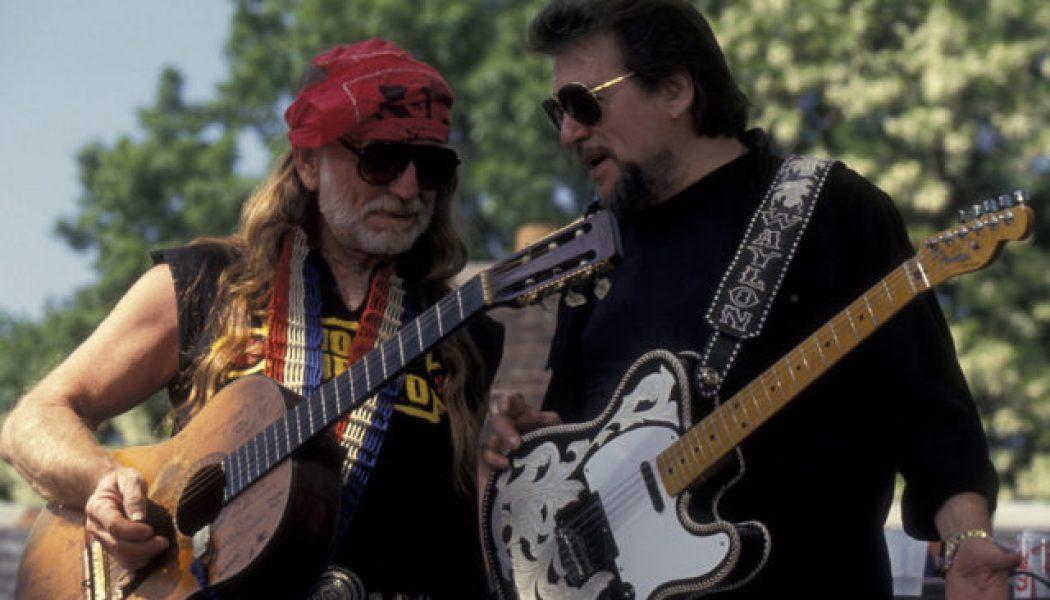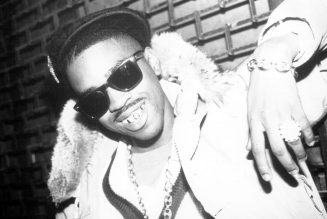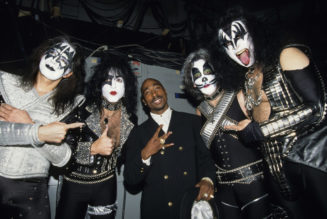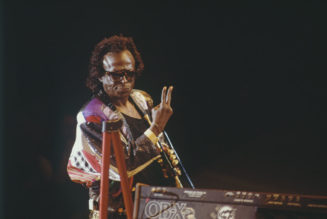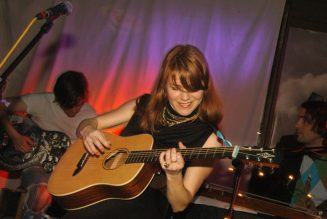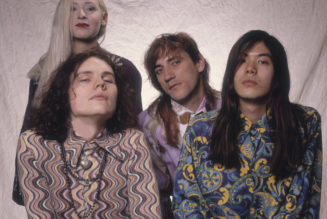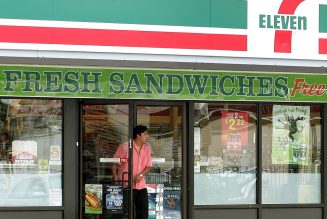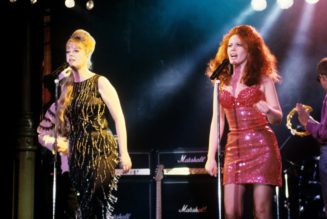This article originally appeared in the January 1988 issue of SPIN. Waylon Jennings was born on June 15, 1937. In on honor of what would have been his 83rd birthday, we are republishing the interview here.
“You’re gonna get in trouble if I write this.”
“I don’t care. You write what I tell ya.”
Waylon Jennings, looking more like an outlaw biker than a cowboy, is dressed in black except for his nylon racing jacket. His trademark black hat never leaves his head. He turned 50 this year and he looks it. He also looks healthy, if weathered. There is no sign of his 20-plus-year addiction to pills and cocaine. He chain-smokes. He’s slightly nervous, but becomes more relaxed as the interview progresses
Waylon is in New York, a city he first visited as one of Buddy Holly’s Crickets, to promote his new “autobiography,” an album and one-man show titled A Man Can Hoss. His wife, singer-songwriter Jessi Colter, sits quietly at a small table by the hotel window. There are no evident signs of destruction or outlaw behavior in his posh hotel room — even the door is intact. Is this the most notorious, most wanted outlaw in country music?
You’re 50 years old now. Are your rough and rowdy days really over?
Well, just when you think they are, they’re probably not. You know, I have more fun now. The drug days are over for sure. But me and Johnny Cash are still gettin’ mean if we want to.
You’ve described yourself as an addict. What drugs were you addicted to?
I took pills, uppers, and cocaine. I did pills until cocaine became fashionable. You know, we were a little late getting cocaine in Nashville. I guess I did about 10 years of each. Most of the things, you know, and it may have been what kept me alive is that I didn’t do a lot of different types of drugs, you know, uppers and downers and all that. I did one type of thing: I always looked for that up thing.
I must have the constitution of 10 men, because right at the end I was doin’ like $1,500 a day in cocaine. I would stay up, and this was a 20-year ritual. I would stay up until I’d crash and then I’d get up. You know, one of the things that I always bragged about was that I never had a hangover. But the deal was, I never gave myself the chance to have a hangover. Because the minute I hit the floor, I hit the floor doing either pills or cocaine.
I wasted a lot of years. I wish a lot of things. I could have been a lot more creative. You know, I spent the last five years that I was on drugs — I withdrew completely from people. I spent more time alone, sitting in my room, with that cocaine bottle in my hand, when I could have been very creative. The thing I am sorry about the most is, you see, the bad thing about it, if you stop and think about it, and I don’t know if anybody’s reading this who’s a drug addict… There is something you don’t think about, but if you do think about it, if you ever have a chance to sit and think about what you’re doin’, it’s your life, you can destroy it if you want to. But look at the people around you, that care about you; think about what it’s doin’ to them. You don’t have to destroy their lives too. And that’s what it does. I actually think it’s worse on them than it is on yourself: because they have to sit and watch someone they love and care about destroy themselves. That was one of the reasons why I was able to pull out of it, because I saw it on my wife Jessi’s face.
I went out to Arizona, just went out there and leased a house, but I had no intention of quittin’. I was just gonna hole up and get the heat off me a little bit, from everybody around me. But I told Jessi when we went there that in 30 days I’d be back doin’ cocaine again and you might as well get ready for that. But I am gonna try and get back on my feet, get off it and stay off it for 30 days and clean up. But after all the pain, mentally and physically, you know, the first couple of weeks when you’re tryin’ to pull up from it, it messes with your sleep. So I spent some time alone, I’d wake up at odd hours and I would just go out and sit out at the back of the house. But then I got seein’ my mind clear enough and seein’ what it was doin’ to her.
Was there any one thing that made you want to quit?
That was it: What it was doin’ to her and my little son, who was about five years old then — between four and five. And you know, his attention span was longer than mine when I was on drugs. He would reach out to me, and I would be there for a minute… and he knew something was wrong with me, even though he was little. Now he refers to that time as when Daddy used to cuss. But anyway, I thought: I want to see him grow up. And I really had no intentions of quitting until I did that, until my mind cleared up and I saw what I was doing, that I was killing people around me, people that were friends of mine. And I was losing everything. You know, the bad about it is I had hit the bottom. I was a mess. I couldn’t even drive a car because I had dizzy spells. I was gonna put it off for two or three months, goin’ out there and cleanin’ up. But something told me, and I remember that much, that I’d better go now.
Why did you start?
Stupidity. It was the thing to do. You hear all the tales about the way Hank Williams was, and the people around me, in the business. You know, pills were the big thing when I came to town. Well, actually, I can’t blame that on Nashville, because I got into pills in Arizona. The thing about it is, with pills and cocaine, that when you first start doing it, you do feel good, you feel wonderful. But you know after you’re addicted to that stuff, you get addicted and you start chasing a feeling that you never feel again.
Do you think drugs will go out with the whole Outlaw image?
No. The drugs came before that. They were actually before that.
How did the Outlaw movement start?
You know what, let’s get all that up front, the way it really was. That was to merchandise and sell records. I remember when they were gonna call that album The Outlaws, and I had been called that before because I had an album out called Ladies Love Outlaws. But I tell you, I argued against that because there was a group called the Outlaws. A great group, and we probably sold some records on the strength of people thinkin’ it was that group, because it says Wanted: The Outlaws. I argued with them about it until we were about an inch away from them changing their minds, but it did work out pretty good.
So the people in the group were you and Willie…
Me and Willie and Tompall Glaser, and of course my wife Jessi Colter. Now she is about as much an outlaw as Mickey Mouse. As sweet as she is, it’s awfully hard to call her an outlaw. But they like to categorize things a lot.
So the whole Outlaw thing was just a marketing tool? There’s no big story behind it?
No. No big story behind it. About the closest thing that Willie ever did to bein’ an outlaw is that he probably came to town and double-parked on Music Row.
What’s your relationship with Willie Nelson?
Relationship! Me and Willie have been friends for 25 years, and 25 out of 30, that ain’t bad. Willie and I, we’re brothers of the road. We run around together and everything. When we started out, we both had the same attitude toward Nashville and things, and they had the same attitude towards him as they did me. Willie and I kept goin’ back to Texas, and I kept tryin’ to hang in there. But Willie and I are great friends. We always will be. He gets mad at me and I get mad at him, but we made a pact a long time ago. Most of our trouble has been caused by people around us, not between me and him. Before we get mad enough to kill one another we’ll talk about it first.
I have a Willie Nelson for president bumper sticker.
You do? Well burn that thing. If there’s anything you don’t want, Hoss, is Willie Nelson to be president. I mean, you don’t even want him to be Secretary of — you don’t even want him to be dogcatcher.
What’s your favorite Waylon and Willie story?
Well, when we were really hot in Texas, before we got hot anywhere else, we were hot in Texas. Now I mean, you might call us stars. Willie picked up me and Jessi at the airport in his new Mercedes. This must be 12 or 15 years ago. We were goin’ out to his house, which is out there close to Dripping Springs, and Willie runs out of gas. That’s just no problem, I mean, we’re in Texas, everybody knows us in Texas. Well, we spent an hour out there, and the people would drive by and wave at us, you know, but nobody would stop, I just couldn’t figure that out. And finally, when the Lone Star Beer truck, which sponsored most of Willie’s shows, drove by, and the drive hollered, “Hey Willie, Waylon, what y’all doin,’” and kept goin’, well, I said, ‘Wait a minute now, Willie, I’m gettin’ tired of this. Me and you might better get in the car and we’ll set Jessi out here and get us a ride.” We might still be there if Connie, Willie’s wife, hadn’t happened to come by. I ain’t kiddin’, we was there over an hour and nobody would stop. They like us, they like out singin’, but they don’t want us ridin’ in their cars with em’ now. They ain’t gonna give no hillbillies lookin’ like me and him a ride.
Do you really by your boots in New York City and your hats in New Orleans?
I buy my boots in New York City, at Billy Martin’s. It’s the only place I can find those sharp toes. I could probably get em’ other places, but I probably bought six or seven pairs of boots over there. They’re Justin boots and they got them sharp toes: them kind that you can get them cockroaches in the corners and smash ‘em. You can’t buy ‘em anywhere else. Whoever saw a cowboy with them round-toed boots.
How did you meet Jessi?
I had been friends with Duane Eddy, and we’re still great friends, I call him my husband-in-law. But when I first met Jessi, she was married to Duane. She had written this duet and Duane is from Phoenix and I was in Phoenix and he asked me if I would sing the duet with her. And I remember that we went down there and they put her on a box beside me. I didn’t meet her again until she and Duane were in the process of getting a divorce. She was born in Phoenix, and I was working in a club there and she came out. I asked her if she wanted to go out with me and she says, “Well, call me in a month when my divorce is final.” So then we got together. You know, when I first met her I didn’t like her. She made me madder than anybody in the world. Now I didn’t realize it until a few months later, but she did it on purpose. She would do things that aggravated me, because she liked to see that fire, as she called it.
There must have been a lot of women on the road!
Oh yeah, and Jessi’s had a lot of things to understand. You know, I’ve been married three times before. Jessi and I have a very honest relationship. Things I did then I can change now. It wasn’t easy on her. She’s probably the only person in the world that would put up with me. In fact, I would venture to say that she is the only person in the world who could have been married to me and stayed with me.
Where is Nashville headed?
I’ve always noticed that through history, ever since the fifties, when pop and rock ‘n’ roll music, when it self destructs, they come back to country for the basics. That’s the time when country music has the cross-overs and things like that, the cross-over artists. Well, Nashville is right on the verge of that again. I think pop music and rock music, and looking at these videos, they’ve gone about as far out as they can go. And it always happens. But Nashville right now is in limbo. They’re kinda searchin’ for what to do, and that happens all the time. They have a little taste of the cross-over and then they try to cut pop records and try to cut things that will cross over. But if you look back through history, the things that have crossed over have been the most grassroots country things like “Detroit City” and things like that. But they get what I call pop-itis. They’re searchin’ right now. I think all music is searchin’. I think it’s all in limbo.
Do you think country music is in for another revival period?
I think so. We need another Billy Joe Shaver, or Kris Kristofferson, or somebody like that. Our music is songs. More than any other music, it’s the songs and the lyrics and the stories. I think we’ve been sitting on our lazy butts out there and not writing. But that’s what I’m trying to do now. I was on-stage one night and I realized that I was tired of singing other people’s songs. I wanted to sing my own songs again, and I wanted to sing something new. I’ve done some good songs written by other people, but I’m interpreting. That’s all it amounts to, and I’m a good interpreter. But that’s not what I’m all about. Part of me is writing, too, and the most important part of country music is the writing.
I heard a lot of Texas coming through on A Man Called Hoss… A little Bob Willis…
Oh yeah, a little bit of Western swing, a little bit of fifties rock ‘n’ roll. When we wrote it, I planned to sing from the beginning to the end of it. Before we even sat down to write the album, I had a list of what I wanted each one of these songs to represent and what I wanted to say. Some of them had titles… all had working titles and subtitles. Like the first one is “Childhood,” the second one is “Texas.” But I just went through my life, and looked at things that were important turning points in my life and things that happened. The most important things in my life are in this album.
Do you still live in Texas?
No, I live in Nashville. I haven’t lived in Texas in 30 years — more than that. But once you’re born and raised in Texas, it’s just like the song, they’ll never take it out of you. I gripe about Texas and west Texas sandstorms because I don’t want to hear no shit from nobody else about Texas.
Music is such a big part of everyday life in Texas. Every other house has a guitar or fiddle and somebody who knows how to play it. The big thing on weekends, back when I was growing up, was singing. Either you go somewhere where they’re havin’ a barn dance or a talent show or you go to somebody’s house. If we went to Grandma’s house, somebody started singin’ and somebody played the guitar. I think that’s why there are so many artists comin’ out of Texas.
You see, the whole thing about that is that there are so many different kinds of country music, and I don’t think people realize that. They say, if you do this, well, you’re gettin’ away from country music, if you do that, it’s gettin’ away from country. But there’s western swing, which is country jazz, that’s all it amounts to. It’s our form of jazz music. It’s expression and everybody playin’ everything they know all at once. And you have cowboy music. Cowboy music and bluegrass are about as far apart as you can get. Or say bluegrass and western swing are the ones that are farthest apart. And yet they’re relative. And then you have your country music, your hillbilly music. The whole thing is, there are so many different kinds of country music, but people try to group it all into one thing. Like the Country Music Association has a bad habit of trying to think that if you don’t do it just one way it’s not country music. And that’s one of the things that I bumped heads with everybody in the establishment about, and had a lot of problems with when I went there. Because I never felt that you had to have all those limits. I think we have just as much right to try a kazoo — if that compliments a record — we have just as much right to use it as anybody. Because if you really want to be pure about what country music is, you can’t even use a pick, you gotta use your thumb on a guitar.
Have you ever been a cowboy?
No. The only thing I did, I did a documentary called “My Heroes Have Always Been Cowboys.” You know, I went down to the O-Six Ranch down in Alpine, Texas, and I went on a roundup and I found out what I wasn’t — and I’m not a cowboy. I’m a cowboy singer, close as I can get to it.
How about rodeo cowboys? Ever hang out with any of them?
Yeah. Larry Mahan and some of those guys. But that I don’t understand. That’s got to be some kind of addiction. There’s got to be something to that. There are a couple of rodeo guys who work for me, and I ask them, “How in the world do you get off one of them bulls and get on them again?” And they say, “Well, the thing is, there’s a little ego to it, you know. I can beat him. I can beat him.” And I think that’s the way all guys are a little bit.
What was it like playing with Buddy Holly in the Crickets?
I’ll tell you, I was so young then, and I was not a good bass player. I played bass in his band and I was his protege. That was our main relationship. Buddy produced the first record I ever cut, “Jole Blon.” It was his idea, his arrangement, gettin’ King Curtis there to play saxophone. And I was his protege. He really believed that I could appeal to other people besides just country fans. He was gonna start his own record label, and that was my first trip to New York. I learned so much from him in the short time that we worked together — about music, about not having limits on your music and about not staying there too long. He taught me that. He says try to pull out when you’re on top.
How did you feel about rock ‘n’ roll at the time?
Buddy said, “If anybody asks you what kind of music you play, tell him ‘pop.’ Don’t tell them ‘rock ‘n’ roll’ or they won’t ever let you in the hotel.” But I’ve always loved that type of music. I love rock ‘n’ roll, real ‘50s rock ‘n’ roll. I think Little Richard’s “Slippin’ and Slidin,” is still one of my favorite things. I think Chuck Berry is one of the great writers of all time, one of the cleverest. He and Roger Miller seem like they ought to be brothers the way they write the clever things they write.
How do you feel about rock ‘n’ roll now?
I don’t understand a lot of it. And I don’t like to condemn it, because, you know what? Some of it has got to be great. I think it’s got some great things in it. I try to watch it and understand it. But I don’t understand a lot of things about it. But that’s because maybe they shoot over my head.
What one incident do you remember most about your association with Buddy Holly?I think it was right here in New York was one of the funniest things. Buddy had my number going in. He knew I’d come right from Littlefield, Texas, and the tallest building I’d ever seen was about 19 stories high. And I knew nothing about this city. It scared me to death when I got here. I remember, the one thing was, he had me so gun-shy about women in this town. Every time I’d see a woman, I’d say, “Golly, looky there, Buddy, lookit that good-lookin’ woman.” And he’d say, “That ain’t a woman, that’s a man with a dress on.” And he did have me gun-shy.
Did you know Hank Williams Sr.?
No, I never did. I never met him.
What’s your relationship with Hank Jr.?
I knew Hank Sr. better than I know Hank Jr. [Laughs]. No, Hank is kinda like my kid brother, something like that. There were times when Hank, after he fell off the mountain and everything, and after his mother died, and his life was kind of at a low ebb. I took him with me on the road and put him in my show and talked to him a lot. I think that maybe I helped him a little bit. Maybe helped him get over that shadow thing. It’s awful hard being Hank Williams’ son and trying to be a singer. But if you look at the things Hank Jr. has done, he’s much more talented than his daddy was. His daddy was there first, and with all respect to Hank Sr., if he came into a studio now and sat down and auditioned, he might not get a deal. Course a lot of those songs are timeless, but some of them aren’t. You stop and think now, if you’re an A&R man and he came in to sing — ‘cause you know the man was not a great singer — he might have a hard time getting a deal. Again, he was there before Hank Jr. but I think Hank Jr. has made his own mark, there’s no shadow there anymore. We call him Hank in other words.
You thought about writing a book, but you said, “There are too many people still alive, and I’d end up dead or divorced if I told everything I know.”
I was gonna write a book. I actually started it. I got about two or three pages in and I was dodging bullets already.
Real ones?
It looked like it; there could have been; if I told everything I knew there’d liable have been a lot of problems for me.
A Man Called Hoss is subtitled “The story of my life before somebody gets it wrong.” Does that mean there are a lot of rumors and untruths circulating about your exploits?
Oh, God, yeah. You know what? If I did everything everybody says I did, I figured it up, I’d be like 150 years old and I would look like a gutted snowbird. And that’s about what this is about, too, because I’ve read things and heard things that people said that I didn’t say and things that I did. “I heard this story about you and so-and-so and so-and-so…” None of it is true. I’ve sat and heard people tell stories on me and they didn’t know it was me sittin’ there.
Do you think you set yourself up for some of this by labeling yourself an outlaw?
I didn’t label myself an outlaw…
By allowing it…
By allowing it, yeah. I’ll tell you, when I first came there, they called me “the Rebel.” I caused a lot of that, I did, but I did it through trying to survive. There was a time when they were tryin’ to fix it so I would have to go back to the house and pull a cotton. They were shuttin’ doors on me everywhere, and of course I closed a lot of doors on myself. The thing is, I — well, a couple of those stories I may have told myself. It’s fun to watch people and see what they think.
You’re not a drinking man anymore?
I never did drink. That used to be one of my big brags. I would sit around and say, “I don’t drink and I never did drink.” There I’d be just stoned out of my gourd on cocaine, but I was real proud of myself because I never did drink. I’ve had times when people would come up to me and say, “Hey, remember when me and you used to get drunk back in Phoenix there?” And I learned a good lesson: the best thing to say is “Yeah, we had a good time, didn’t we?” Although it never really happened because I never was a drinker.
Do you still play the honky-tonks?
Once in a while. In fact, that’s the best way to get back to the basics. You can play the coliseums and the big auditoriums and after a while the audience starts to look like chairs instead of people, you can’t get that one-on-one thing with people. That’s one of the things I’m doing with this show, too. There’s a real wonderful, one-on-one thing that I do with the people. It’s like I’m talkin’ to one person. And It’s awful hard to do that when you’re lookin’ at chairs. So even in my hottest days, I had em’ book at least one nightclub, or a honky-tonk, to get me back in touch.
Do you miss it?
Well, I don’t wanna do it all the time. I just want to do it about once a month.
Did you ever play one of those places where they throw beer bottles at the stage?
You bet I played them things. In Bozier City, Louisiana, I played in a place where they had chicken wire around the stage. I said, “What’s all that chicken wire doin’ around there?” And they said, “Well, you’ll see about 11 o’clock.” And sure enough, beer bottles come flyin’ and they’d holler at ya to do their song and if you don’t do that song right when they think you ought to, you’re liable to get a beer bottle thrown at you.
What was it like growing up in a small town in west Texas? What stands out?
It’s kinda like bein’ jerked up by the hair on the head. I had a pretty normal life. We didn’t have any money. But you know what? We didn’t know the difference. Nobody else had any either. My dad was a hard-workin’ man and I worked from the time I was 10. That was one of the things I had to learn to do as an adult, was play. ‘Cause I didn’t know how because I worked all my life.
What does “a pretty damn good windmill man” [from the song “Littlefield”] mean?
You know, I got that from a guy named Sky Corbin, and his dad was the one that said it. He was an old Texas farmer and he used to say “Lover, fighter, wild-horse rider and pretty darn good windmill man.” Well, a windmill man was probably the worst job a guy can have back there. Because the wind is always blowin’ and it can blow as high as 80 miles an hour. And that thing can change direction and that windmill can knock you off of there. It’s the greatest, dirtiest job you can have.
Do you have a favorite on the road story?
Well, now my mind is goin’ a hundred miles an hour. You know, dain bramage has set in. Probably the best story I got, maybe not the best one, but it’s true. We were booked one time up north here, it was me, Dotty West, Hank Snow, Conway Twitty. Well, this guy that booked us, and this was about 15 years ago, he sent me to Syracuse, where Dotty was supposed to be, and he sent me to Rhode Island, where I was supposed to be. Well, we got up there in Syracuse, and I was there with Conway Twitty, and I have never seen that many ugly women congregatin’ in all my life, and I told him so. I said “Boy, you do draw an ugly class of women.” And he said, “Well, you were booked on the show, too.” And I said, “Yeah, but I wasn’t advertised.”
What’s your favorite story about the days when you were living with Johnny Cash?
When Johnny and I were living together, you know, I was supposed to clean the joint up and he did the cookin’. Well he had a good job, because me and him would probably eat about once a month whether we were hungry or not. But John could cook breakfast. He could cook every breakfast meat you could think of: pork chops, bacon, sausage, ham, he cooked eggs… but the best thing he cooked was gravy and biscuits. Now, if you can imagine, in those days, John Cash wore those black suits every day of his life — he also wore em’ out from the inside. You know, John could fidget better than anybody in the world. He had his twitch down real good. You can’t imagine anything like Johnny Cash, after he gets through cookin’ us breakfast, and havin’ bakin’ powder from one end of him to the other.
You and Johnny Cash both favor black.
I think both of us may have gotten a little bit of that from old Lash LaRue, the old cowboy. I know I got my hat from him. I saw him when I was a kid. He came to my hometown and it was the most amazing thing I’d ever seen. When he did his whip trick onstage at the theater. It was the only place we had for him to appear and they’d play his movie after he did his whip. He made a personal appearance there and he ripped the screen — and the last time I was in that theater that screen was still ripped where he ripped it with that whip. Anyway, I was a little old kid then, and I went to the lobby to get a drink of water and there stood Lash LaRue, with his whip, his gun, his hat and all. Dressed in black. They were arguing. Him, the manager and the owner of the theater. They was telling him he’d have to pay for the screen. And he told them, “I told you that stage was too small when I went out there. You should have had insurance to cover it.” And they said, “Well, you’re gonna have to pay for it.” And he says, “I got a gun and a whip that says I won’t.” And for a kid about nine years old, that was probably the grandest thing I ever heard in my life.
Who’s your favorite country artist of all time?
George Jones. Has to be. If everybody sounded like they wanted to, they’d all sound like George Jones. If anybody asked you, if you’re just walkin’ down the street and somebody says, “Hey, what is country music?” The only answer you could give em’ is George Jones.
Do you have a favorite rock or pop artist?
Yeah. I love Bob Seger. He’s one of the best rock ‘n’ rollers there’s ever been. One of my favorite songs in the world is “Katmandu.” I love that, but I don’t do that in my shows. I’m under no illusion that I can do rock ‘n’ roll anymore.
You won four CMA awards. How do you feel about these awards in general?
I think they’re a joke…
You’re gonna get in trouble if I write this.
I don’t care. You write what I tell ya. I think they’re controlled by the record companies. It’s controlled by block voting, the people have nothing to do with it. They say they don’t know who’s gonna get them and all this, and they keep it a big secret, and that’s a big bunch of bull. I think the thing is, and when it’s important, is when you’re first starting out — when you first come to Nashville. To be accepted by the people in the business is wonderful. And that’s what they should do, really. They are not doing more than that, and I agree with it. They’re giving it to the younger people instead of — you know, how much more, from one year to another, can Willie Nelson do? How can you say he’s the entertainer of the year because he’s made great strides in big leaps and bounds. He didn’t do that. It’s the people who come from oblivion and establish themselves. Now they’re the ones who should get it. The awards serve a good purpose in a way, but let’s not fool eachother: they’re controlled and we all know that.
What were your most serious problems with the Nashville music establishment?
One, to control what I was doing. I wanted to be able to go in there and do something and come out and have it be me — and not something that someone else had come up with. I had to have control. I had to get away from that establishment where it was like an assembly line, doing it using the Nashville sound, using the same musicians and not being able to control anything. And consequently, I never had a hit record, or had a No. 1 record, until I did walk away from there and go and do something on my own in another studio.
What was the most embarrassing thing that ever happened to you?
The most embarrassing thing that ever happened to me was in Kansas City. I went onstage, and what’s the most embarrassing thing that can happen to you onstage? It’s for your fly to be open. Well my zipper broke on my damn Levis on the first song, and there were about two or three girls out in the front row that let me know my fly was open. Well, I was monkeying around there trying to get that thing fixed. Never could get it fixed, and here I am, I’ve done one song and I’ve gotta do a show. Jessi came out there with some black masking tape and tried to tape it down but that didn’t work. So I had to do the whole show with my fly floppin’ open, and goin’ back and putin’ the tape back across it. Wille Nelson was really sympathetic, though. When he came out he asked me if I was tryin’ to count to 11.
What was the worst trouble you ever got into?
Me? They almost sent me to reform school when I was a kid. Just for gettin’ in meanness. But they tried to bust me one time in Nashville, that’s what the outlaw bit was all about. They came bounding in like they had Al Capone cornered or something. But they never got it down.
What would you like to be remembered for?
That you can, that a person can blow it… can make it and blow it and hit bottom doing drugs, and come back and be able to survive that and do something worthwhile.
